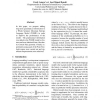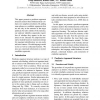17 search results - page 1 / 4 » Improvement of a Whole Sentence Maximum Entropy Language Mod... |
ACL
2001
13 years 6 months ago
2001
In this paper, we propose adding long-term grammatical information in a Whole Sentence Maximun Entropy Language Model (WSME) in order to improve the performance of the model. The ...
ACL
2006
13 years 6 months ago
2006
Sentence compression is a task of creating a short grammatical sentence by removing extraneous words or phrases from an original sentence while preserving its meaning. Existing me...
COLING
2010
12 years 12 months ago
2010
An unsupervised discriminative training procedure is proposed for estimating a language model (LM) for machine translation (MT). An English-to-English synchronous context-free gra...
IJCNLP
2004
Springer
13 years 10 months ago
2004
Springer
This paper treats nominal entity tagging as a six-way (five categories plus nonentity) classification problem and applies a smoothing maximum entropy (ME) model with a Gaussian pr...
ACL
2009
13 years 2 months ago
2009
This paper presents a predicate-argument structure analysis that simultaneously conducts zero-anaphora resolution. By adding noun phrases as candidate arguments that are not only ...


